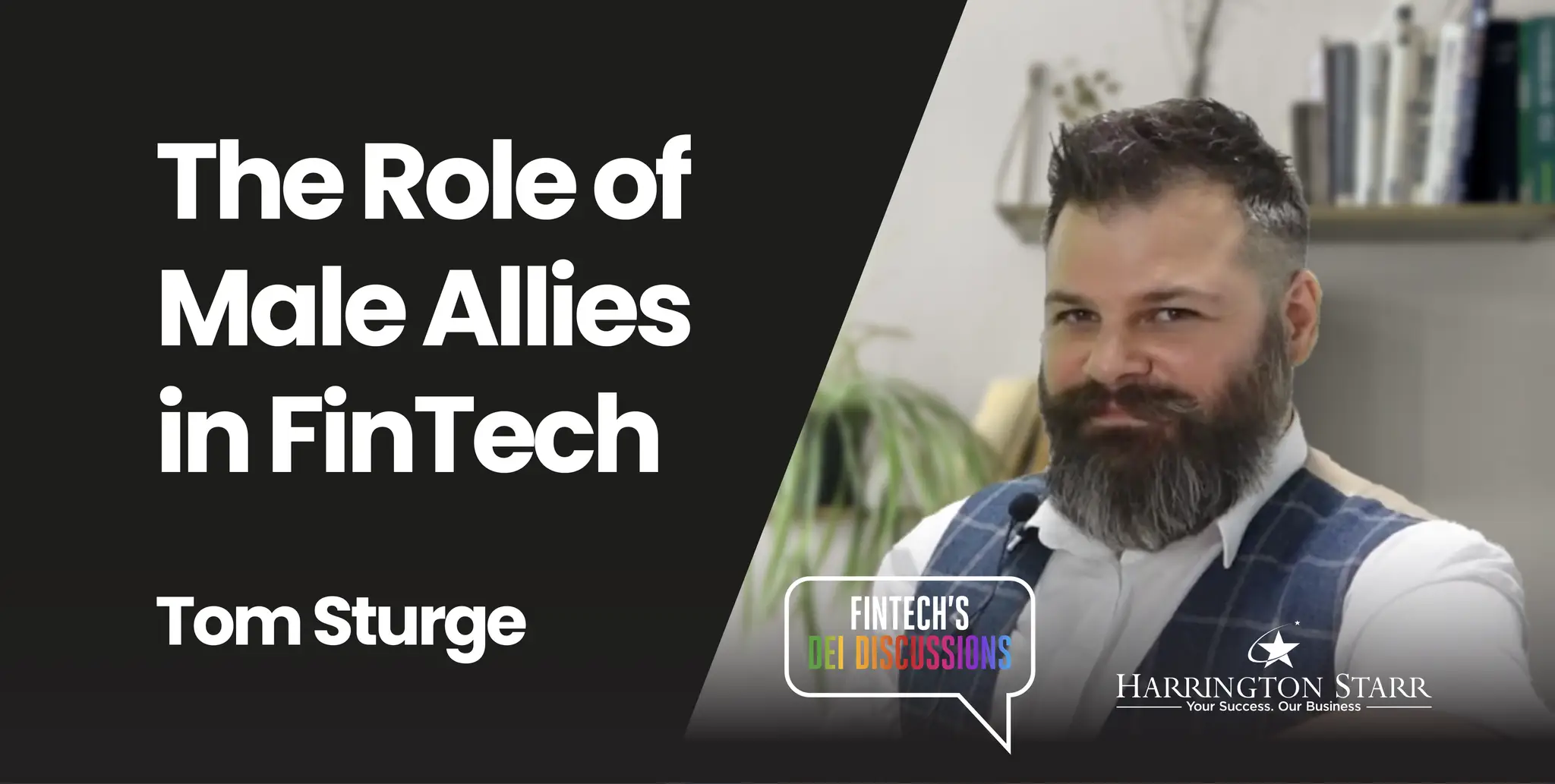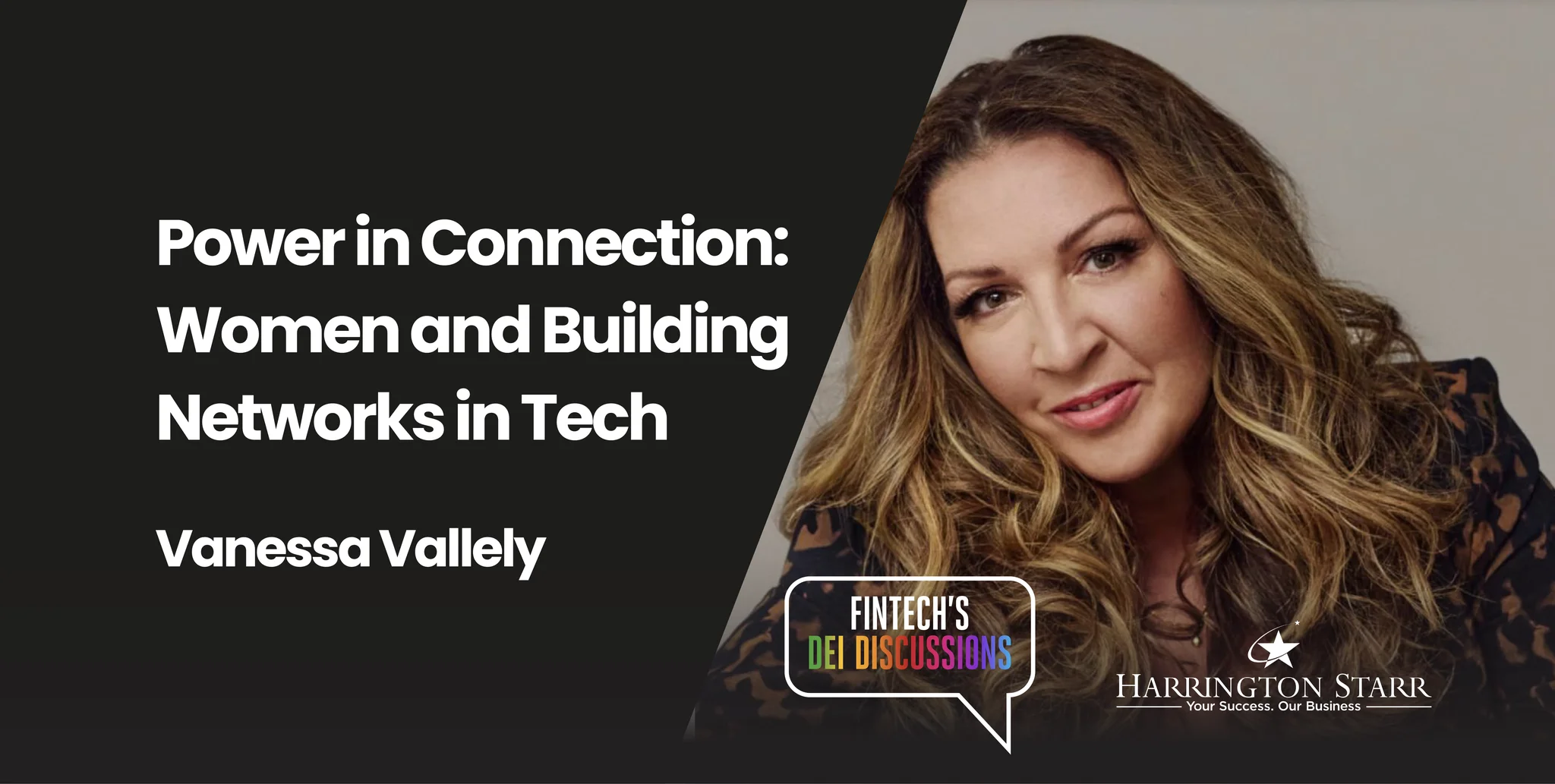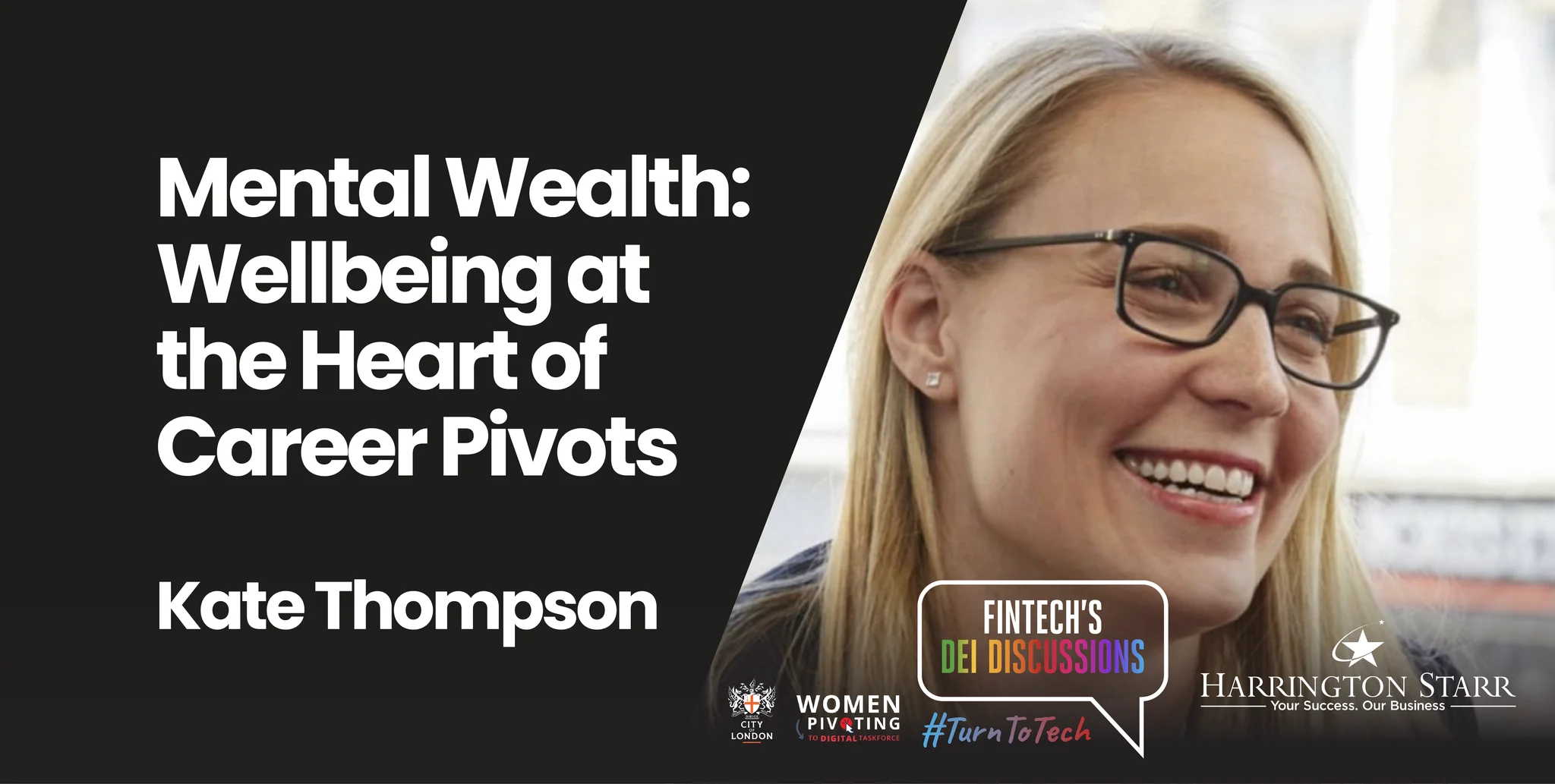
In a new episode of FinTech’s DEI Discussions, hosted by Nadia Edwards-Dashti, Chief Customer Officer at Harrington Starr, we’re introduced to a compelling voice driving real change in the financial technology sector. This instalment features Tom Sturge, a seasoned technologist and the Male Allyship Organiser for the European Women Payment Network (EWPN) and Mohtas Media, who shares his journey from silent observer to vocal advocate for inclusion. With Harrington Starr leading the charge in FinTech recruitment across London, Belfast, and New York, this conversation is a timely reminder that hiring for diversity is not only a moral imperative but a business-critical strategy.
Building a Career in FinTech and Spotting the Diversity Gap
Tom opens up about his extensive background in technology, which spans over two decades and various industry verticals. Starting out in the early 2000s, he ran his own consultancy, initially managing projects and outsourcing to local tech firms. Frustrated with the inconsistency in output and the lack of quality control, he soon transitioned into front-end development to ensure the standard he demanded was met. This self-sufficiency eventually drew him into the heart of London’s vibrant startup culture. Over the years, he’s built products in FinTech, PropTech, and MedTech, offering him unique insight into the common challenges and cultural dynamics that permeate tech teams regardless of sector.
His experience revealed a glaring issue repeated across his career: an overwhelming lack of gender diversity in engineering teams. Often, when women were hired, they were treated as token appointments, underrepresented, undervalued, and largely unheard unless directly spoken to. For Tom, this imbalance wasn’t just visible, it was deeply uncomfortable. He often found himself as the sole advocate for these underrepresented colleagues, even when it meant jeopardising his own career prospects.
Why FinTech Needs More Than Just Awareness
When asked what prompted him to formalise his allyship efforts through EWPN, Tom is candid. The spark was ignited by years of watching capable women and minority voices overlooked in favour of the status quo. In one particularly striking example, he recalls fighting tooth and nail to secure equal pay for a female engineer whose performance far outshone her peers. When management refused to address the disparity, Tom offered his own bonus as a solution, ensuring she received the recognition she deserved. It wasn’t an easy decision, but it was the right one.
This philosophy of proactive advocacy underpins his current work at EWPN. Together with his colleague Lanre, Tom is spearheading efforts to create a structured, impactful allyship programme. While the initiative had previously existed in name, it lacked practical execution. Now, through curated newsletters, community events, and peer support initiatives, the programme aims to move beyond awareness and into action.
For companies partnering with FinTech recruiters like Harrington Starr, this episode underlines a crucial consideration: technical ability alone does not define leadership potential. The future of FinTech depends on hiring professionals who are not only innovative but also courageous in their commitment to equity and inclusion.
Scaling Tech Companies With Inclusive Cultures
Tom offers a unique lens on how inclusion must scale alongside technology. He describes the changing role of the Chief Technology Officer (CTO) across different growth phases, from the ‘founding engineer’ CTOs of fledgling startups to the strategic, culturally-driven CTOs steering global enterprises. He introduces a helpful framework: the 7-70-700 rule. At each of these growth milestones, the complexity of management, culture, and inclusion shifts. Companies that fail to adapt risk losing cohesion, innovation, and talent.
What’s changed in recent years, Tom notes, is the speed at which companies go international. Once an ambition for companies with a headcount of over 1,000, global expansion now often occurs within the first hundred hires. This creates immediate pressure to consider diverse cultures, languages, and perspectives, not just from a market or user experience standpoint, but internally as well. It demands inclusive hiring practices and culturally intelligent leadership. FinTech staffing agencies, particularly those operating internationally, are uniquely positioned to help firms anticipate these needs and secure diverse leadership from the outset.
The Hidden Dangers of Vibe Coding in Product Development
One of the most compelling discussions in the episode centres on the concept of “vibe coding.” Tom explains this term as shorthand for unconscious, biased coding practices that go unchallenged due to homogenous teams. In FinTech, where many products are designed by all-male, often all-white teams, the default perspectives coded into systems often exclude or misrepresent significant parts of the user base.
Artificial Intelligence (AI) is a particular concern. Despite the industry’s best efforts, most large language models are trained on data that centres male experiences. Tom points out how the output from these tools, if left unchecked, defaults to male pronouns and perspectives. Creating inclusive AI requires users to consciously prompt for gender-neutral or female viewpoints. That shouldn’t be necessary, but at present, it is.
This subtle but dangerous imbalance in technology design reinforces systemic exclusion. For FinTech product teams, the message is clear: inclusion can’t be an afterthought. It must be a central consideration from ideation through to delivery. For recruiters in FinTech, understanding these nuances is essential. Candidates who are mindful of data bias and actively seek to counter it will be instrumental in ensuring the sector’s continued growth is equitable.
Inclusive Design Isn’t Just Ethical, it’s Smart Business
Tom uses a number of examples to illustrate how designing with inclusion in mind often benefits all users. A standout case is the Apple Watch’s pinch gesture control. Originally developed as an accessibility feature for users with limited motor function, the tool was buried deep in the settings menu. Over time, its utility became clear to a wider audience, and Apple eventually elevated it to a marquee feature in its Ultra product line. What began as a niche solution is now mainstream.
Nadia adds another brilliant comparison: subtitles. Initially created to assist in language translation or support users with hearing impairments, subtitles are now a default feature for many users, enhancing comprehension, engagement, and accessibility across a variety of scenarios.
These stories aren’t just feel-good examples; they’re strategic lessons. When companies build with accessibility and inclusion from the beginning, they don’t just accommodate the few, they elevate the experience for everyone. In FinTech recruitment, this further underscores the importance of finding candidates with the foresight to embed these practices into their work.
Creating Safe Spaces to Support Active Allyship
Beyond product design and hiring decisions, allyship is about culture. Tom and Nadia reflect on how difficult it can be for individuals to speak up when something feels wrong, especially in hierarchical or male-dominated settings. Creating safe spaces, such as meetups, roundtables, or informal support groups, gives people the opportunity to voice their concerns and share their experiences.
Tom is particularly passionate about building these forums into the EWPN’s allyship programme. He believes that it’s not enough to read articles or attend events; people must actively participate in shaping their environments. Whether it’s saying “that doesn’t feel right” or encouraging others to reflect on exclusionary behaviours, real change happens through dialogue and shared commitment.
The same principle applies when building inclusive teams. Candidates need to know they’ll be heard. Employers must cultivate spaces where diverse voices are welcomed, not silenced. FinTech recruitment agencies can support this by placing professionals who are skilled not only in their domain but also in empathy, communication, and cultural awareness.
Why It’s Everyone’s Problem, even If It’s Not Happening to You
Tom shares a powerful sentiment that resonates throughout the episode: “We all need to address problems before they start becoming our problem.” Waiting until an issue affects you personally is not allyship, it’s self-preservation. True inclusivity means advocating for change even when you’re not directly impacted.
He cites the Apple Watch once again as an example of inclusive design that started from addressing a minority need but ultimately enhanced the product for all users. The same logic applies to workplace policies, leadership training, and organisational culture. When companies take a preventative approach to inclusion, they avoid costly mistakes, boost morale, and build more resilient, adaptable teams.
Cross-Cultural Communication and the Value of Listening
The discussion expands to consider how different cultures engage in professional settings. Tom shares experiences of working with Brazilian, Polish, and other international teams where communication styles vary. For instance, Brazilian engineers may be hesitant to admit they’re struggling, while Polish team members may prefer factual responses over subjective input.
These subtle dynamics can lead to misinterpretation unless leaders are culturally aware. For global FinTech firms, this insight is invaluable. Effective leadership in diverse teams means learning to listen differently, to recognise the value in quieter contributions, and to create mechanisms for everyone to contribute meaningfully. In the world of FinTech recruitment, cultural competency is a growing requirement for senior hires.
How to Get Involved with EWPN’s Male Allyship Programme
For those inspired by Tom’s work and eager to contribute, there are easy ways to get started. The EWPN website offers a form to sign up for the Male Allyship programme, and Tom encourages anyone, regardless of background or level, to join. The group is currently launching a newsletter to share useful articles and updates about EWPN events, including their annual awards in October.
There’s also an open invitation to connect directly with Tom on LinkedIn. Whether you’re a leader wanting to introduce allyship in your organisation or an individual seeking guidance, the door is open. As Nadia reminds listeners, “Anyone can be an ally, and anyone can start anywhere.” This ethos aligns perfectly with Harrington Starr’s commitment to DEI in recruitment and reflects the values we look for in both clients and candidates.
FinTech Recruitment for a Fairer, More Inclusive Future
As the episode draws to a close, Tom leaves listeners with one final insight: inclusion often means uplifting the quieter voices in the room. In meetings, decisions, and culture, it’s essential to balance out the loud with the overlooked. Many of the most innovative and valuable ideas come from those who aren’t immediately heard, but who, with encouragement, can change the game.
This message is a call to action for every hiring manager, team leader, and recruiter working in FinTech. Diversity, equity, and inclusion are not side projects; they’re foundational to building high-performance teams. At Harrington Starr, we take pride in helping companies hire talent that not only excels technically but also enhances the culture and broadens perspectives.
This episode of FinTech’s DEI Discussions is more than a conversation. It’s a blueprint for the kind of industry we want to build, one where every voice matters, and where active allyship isn’t just encouraged but expected.
If you’re hiring FinTech talent in London, New York, or Belfast, or if you’re a candidate passionate about building a more inclusive financial technology industry, get in touch with Harrington Starr today. Together, we can build the future of FinTech on a foundation of innovation, inclusion, and integrity.





